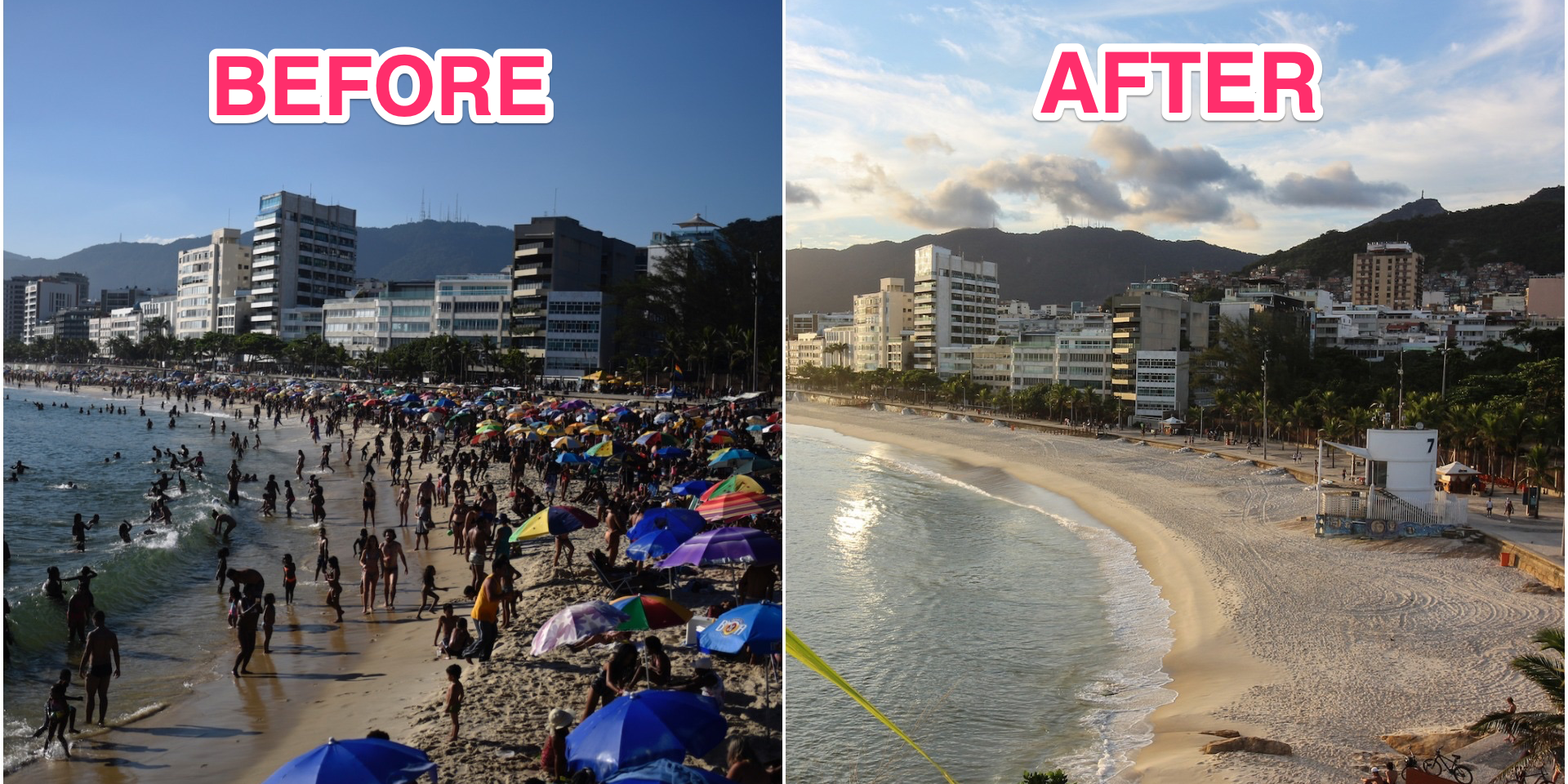- On March 17, Rio went into lockdown after Gov. Wilson Witzel declared a city-wide state of emergency, that included ordering people to avoid beaches and public pools.
- Aerial photos show a stark contrast between what the city’s beaches looked like before and after the coronavirus.
- The city’s Christ the Redeemer statue, a popular tourist destination, is also empty.
- As of March 31, Brazil had 5,717 confirmed case of COVID-19, and 201 deaths, according to The Brazilian Report.
- Here’s what Rio looks like during the coronavirus pandemic.
- Visit Business Insider’s homepage for more stories.
BEFORE: Rio de Janeiro’s beaches, including Copacabana and Ipanema, are famous. According to The Guardian they evoke: “freedom, youth and long, sun-kissed limbs.” In the summer it can be difficult to see the sand.

Foto: Early summer days at the beaches of Rio in 2016. Source: Luiz Souza/NurPhoto via Getty
Source: The Guardian
AFTER: But after Rio Gov. Wilson Witzel declared a city-wide state of emergency on March 17 that was no longer a problem.

Foto: Copacabana beach amidst the coronavirus pandemic on March 29 in Rio de Janeiro. Source: Buda Mendes/Getty
Source: ABC News
BEFORE: Ipanema, a two-mile-long golden beach, is well known from the song: “The Girl From Ipanema.” This is the beach on a summer’s day last year.

Foto: Summer in Rio de Janeiro on the beach of Ipanema in January 2019. Source: Fabio Teixeira/ NurPhoto / Getty
Source: US News
AFTER: This is Ipanema mostly deserted on March 27.

Foto: Ipanema Beach in Rio de Janeiro on March 27. Source: Luiz Souza/NurPhoto / Getty
BEFORE: According to a New York Times report in 1970, the beaches were “an easy safety valve for the pressures of urban living in the subtropical heat.”

Foto: An aerial view of Copacabana Beach in 2016. Source: DeAgostini/Getty
Source: The New York Times
AFTER: But even before the lockdown beach days were being disrupted by firemen "blaring recordings," telling people to go home, according to ABC News. Here's what it looks like from above on March 29.

Foto: An aerial view of Copacabana beach amidst the coronavirus pandemic on March 29 in Rio de Janeiro. Source: Buda Mendes/Getty
Source: ABC News
BEFORE: Other than swimming and sunbathing, Rio's beaches are filled with people playing football or volleyball.

Foto: Locals play beach volleyball at Ipanema beach in 2010. Source: Tim Clayton/Corbis via Getty
AFTER: Now the volleyball nets have been removed. A lone girl sits under a tree on March 28.

Foto: A girl sits under a tree on an empty Copacabana Beach during a sunny Saturday morning on March 28 in Rio de Janeiro, Brazil. Source: Alessandra del Bene/Getty
BEFORE: People can exercise, walking or cycling, along a pedestrian route beside the beaches, too.

Foto: Copacabana beach in November 2015 in Rio de Janeiro. Source: Frédéric Soltan/Corbis / Getty
AFTER: Very few were people were out exercising on March 29.

Foto: An aerial view of Copacabana beach amidst the coronavirus pandemic on March 29 in Rio de Janeiro, Brazil. Source: Buda Mendes/Getty
BEFORE: Another bustling swimming spot in Rio is Piscinao de Ramos or "big pool of Ramos," a man-made salt-water lake. It's a popular place for locals to swim at that's closer to their homes.

Foto: People enjoy the man-made beach in 2012 in Rio de Janeiro, Brazil. Source: Melanie Stetson Freeman/The Christian Science Monitor via Getty
Source: PRI
AFTER: On March 28, it was deserted.

Foto: An aerial view of a deserted Piscinao de Ramos amidst the coronavirus pandemic on March 28 in Rio de Janeiro. Source: Buda Mendes/Getty
BEFORE: It's not just the beaches. Rio's Christ the Redeemer statue typically gets about 2 million tourists each year.

Foto: An aerial view of Christ the Redeemer in Rio de Janeiro in 2014. Source: Yasuyoshi Chiba / AFP / Getty
Source: ABC News
AFTER: But on March 17, it closed. On March 19 there were no tourists taking selfies with the statue.

Foto: An aerial view of Christ the Redeemer on March 19 in Rio de Janeiro. Source: Buda Mendes/Getty
Source: ABC News
